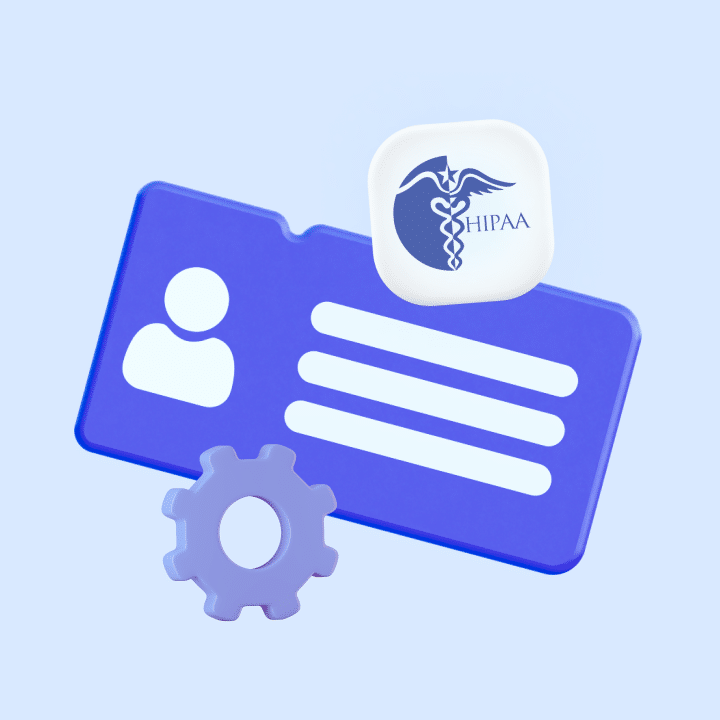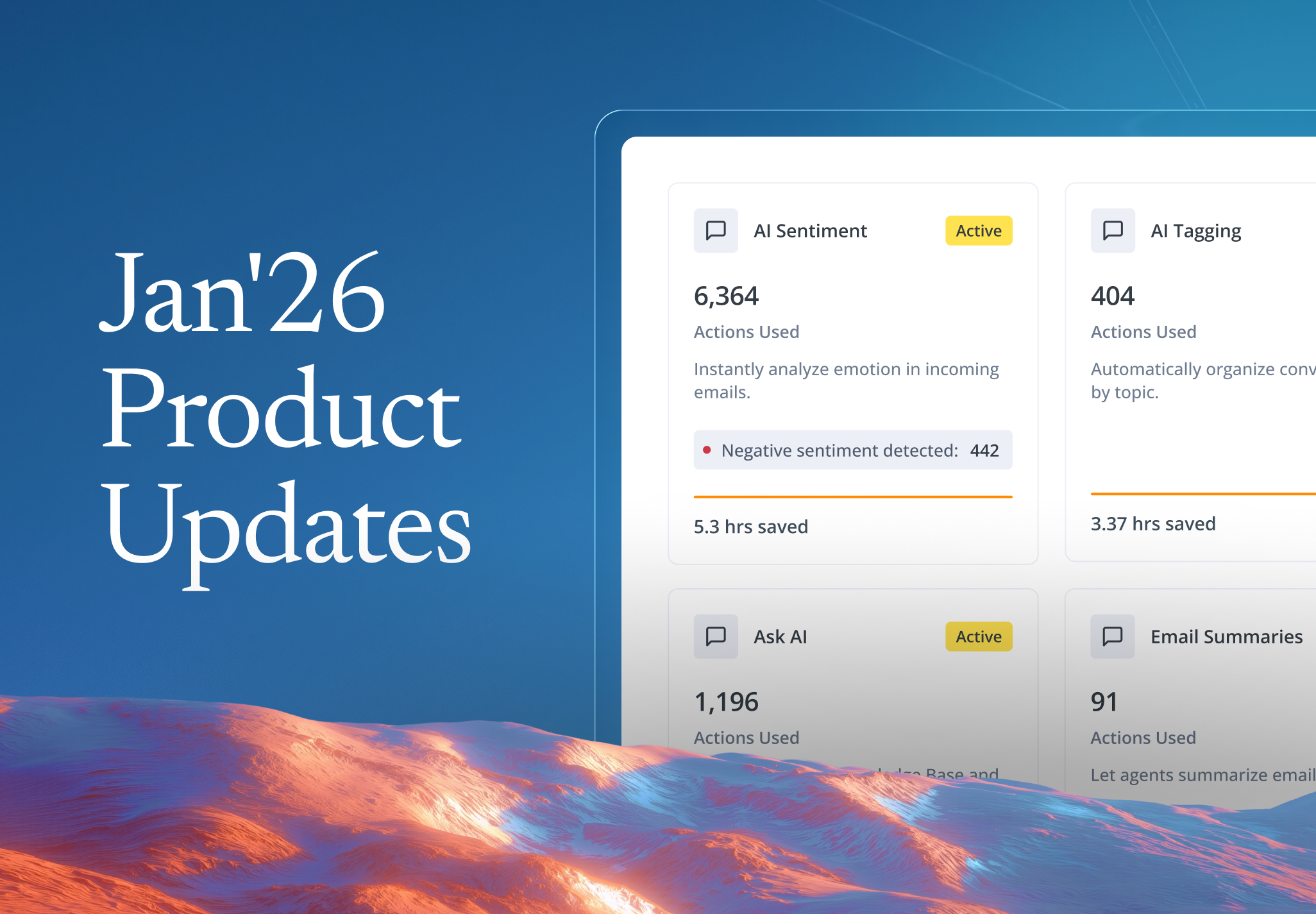Today, where instant gratification is not just desired but expected, the role of FAQ software in businesses is akin to having a personal assistant for each customer. Imagine each query a customer has is like a missing puzzle piece in their understanding of your product or service. FAQ software seamlessly fits these pieces together, offering a complete picture without delay or confusion.
It’s like walking into a well-organized library, where the librarian (the FAQ software) knows exactly where every book is located. Customers don’t have to wander through aisles; they’re guided straight to the book they need. This efficiency not only saves time but also enhances the overall customer experience.
In this article, we will uncover the top 10 FAQ software of 2025, helping businesses choose the right tool to turn every customer interaction into a positive and informative experience. Let’s begin with understanding what FAQ software is.
Table of Contents
- What is an FAQ software?
- 10 best FAQ Software For your Business in 2025
- How do you choose the right FAQ software for your business?
What is an FAQ software?
FAQ software, essentially, is a digital tool designed to streamline the process of managing and responding to frequently asked questions.
It serves as a centralized repository where businesses can store, organize, and display answers to common customer inquiries.
This technology not only helps customers find information quickly and efficiently but also reduces the workload on customer service teams by providing self-service options.
Key features of FAQ software typically include:
1. Search Functionality: Allows users to easily find specific information.
2. Categorization: Organizes questions into relevant topics or categories for easier navigation.
3. User-Friendly Interface: Ensures that both customers and staff can navigate the FAQ section without difficulty.
4. Analytics and Reporting: Offers insights into the most frequently asked questions and user engagement.
5. Customization: Enables businesses to tailor the look and feel of their FAQ section to match their brand.
6. Integration Capabilities: Seamlessly integrates with other tools and platforms used by the business.
7. Multi-Channel Support: Provides consistent information across various customer touchpoints.
8. Update and Edit Options: Allows for easy updating of information to ensure accuracy and relevance.
By implementing FAQ software, businesses can effectively manage customer inquiries, enhance the customer experience, and ensure that their support resources are utilized efficiently.
10 best FAQ Software For your Business in 2025
With a plethora of FAQ software available in the market, it can be difficult to pick one. Find the features, pros, cons, and pricing of the top 10 FAQ software in 2025 below to make an informed decision:
1. Hiver
Hiver is an extremely easy-to-use customer service software, and one of its standout features is the ability to help teams build a repository of FAQs.
Your team can create and maintain a centralized knowledge base – for both customers and employees. Articles can be categorized into different topics, and they can be edited and updated using a WYSIWYG editor.
Teams that create a knowledge base using Hiver can easily connect it with their daily support operations. For instance, support reps can insert links to FAQ articles in chat conversations with customers. They can also activate the AI Co-Pilot feature which scans through your repository of FAQs to draft a response for a customer query.
Other key features include a search bar functionality, custom branding, and an analytics dashboard that tells you which articles are helpful and which ones aren’t.
Note: Hiver is not just a tool for managing your FAQ page. You can use it to handle support interactions across email, chat, WhatsApp, and phone. All these support channels can be accessed from a left side panel. Once you click on any of them, you can see a list of customer conversations under that channel. Here, you can filter by assignee, ticket status, and other criteria.

Pricing:
Hiver’s knowledge base offering is part of its forever-free plan. Here are the paid plans:
- Lite plan: $19/per user/per month
- Pro plan: $49/per user/per month
- Elite plan: $79/per user/per month
2. HelpCrunch
HelpCrunch is a versatile customer communication platform that combines live chat, email marketing automation, and a help desk into a cohesive solution. Ideal for small to medium-sized businesses, HelpCrunch offers an integrated approach to customer service, providing a streamlined experience for both customers and support teams.
HelpCrunch incorporates a knowledge base and chat into one solution, allowing for easy access to information and real-time support.
The knowledge base is designed with a modern look, reducing the need for extensive customization. It integrates seamlessly with the chat system, ensuring a cohesive experience for users seeking support.

Key features of HelpCrunch:
- Integrated Knowledge Base and Chat: Offers a unified solution for customer queries and support.
- Modern Design: The default design of the knowledge base is contemporary, requiring minimal customization.
- Customization Options: Includes full customization features for those who need them.
- User-Friendly Interface: Designed for ease of deployment and management, particularly suitable for small to medium-sized businesses.
Pros
- Cost-effective and easy to deploy.
- Integrated solution combining knowledge base and chat.
Cons
- Customer support response times can be slow during peak periods.
- Advanced features may require some experience to use effectively.
Pricing
Basic: $15 per user per month
Pro: $25 per user per month
Enterprise: Custom pricing
Free Trial: 14 days
3. Document360
Document360 is a comprehensive FAQ and knowledge base software that stands out for its robust features and ease of use. It is particularly beneficial for businesses looking for an intuitive platform to create detailed and searchable online content for their customers and employees. Document360 supports a tree navigation structure and full predictive search, enhancing user experience in finding relevant articles and information.
Document360 excels in its ability to create and manage FAQs. The software supports Markdown for content creation, offering a state-of-the-art editor and category manager. Additionally, it provides options for making FAQs public or private and integrates a Knowledge Base Assistant for seamless addition of FAQs to websites or SaaS applications.

Key features of Document360:
- Intuitive Markdown Editor: Simplifies content creation.
- Version Control: Allows rollback to different versions of FAQs.
- AI-Powered Search: Enhances the ability to find relevant information.
- Third-Party App Integrations: Extends functionality through integration with apps like Drift, Intercom, and Freshchat.
Pros
- User-friendly interface and content creation tools.
- Comprehensive search functionality for ease of information retrieval.
Cons
- Pricing may be high for smaller businesses.
- Limited collaboration capabilities on single documents.
Pricing
Starter: $99 per month
Business: $299 per month
Enterprise: Custom pricing
Free Trial: 14 days
4. Helpjuice
Helpjuice is a powerful knowledge base software designed to streamline customer support and internal knowledge sharing. Renowned for its user-friendliness and customizable nature, Helpjuice offers a robust platform for creating and managing a comprehensive knowledge base.
Helpjuice shines in its ability to create dynamic and engaging FAQ sections. It features content import/export capabilities, powerful integrations, AI-powered assistance for auto-suggestions, a notification system for content updates, and API access for integrating the knowledge base with existing software.

Key Features of Helpjuice:
- AI-Powered Assistance: Enhances user experience with relevant information suggestions.
- Content Import/Export: Simplifies content migration and backup.
- Notification System: Keeps team members updated on knowledge base changes.
- API Access: Facilitates integration with other software systems.
Pros
- Customizable FAQ section.
- Powerful integrations with other applications.
- AI-assisted search capabilities.
Cons
- Limited knowledge base templates, making customization difficult.
- Only one help site per account, increasing cost for multiple sites.
- Steep learning curve with complex settings and configurations.
- Limited reporting and analytics compared to some competitors.
Pricing
Basic: $120 per month
Standard: $360 per month
Professional: $600 per month
Free Trial: 14 days
5. Flowlu
Flowlu is an all-in-one business management software with a strong focus on knowledge base and FAQ management. It’s designed to cater to various business needs, including project management, CRM, and knowledge sharing.
Flowlu’s knowledge base features are geared towards efficient information management and accessibility. It allows you to control access to sensitive information through knowledge base access management, ensuring security and privacy. The software also offers a streamlined collaboration system, enabling team members to provide feedback, suggest enhancements, and communicate effectively within the platform.

Key Features of Flowlu:
- Knowledge Base Access Management: Controls who can view certain information.
- Help Center Knowledge Base: Easily accessible to customers and users across different devices and software.
- Streamlined Collaboration: Facilitates team communication and feedback on articles.
- Full-Featured Mobile App: Provides access to all Flowlu functions on mobile devices.
- Secure Client Portal: A digital hub for client collaboration and information exchange.
Pros
- Intuitive and user-friendly interface.
- Comprehensive solution for various business functions.
- Effective knowledge base management.
- Mobile app for on-the-go access.
Cons
- Limited project management styles (primarily Kanban).
- Some users reported issues with email syncing.
- Lack of localization for certain languages like Spanish.
- Limited web form options and customization.
Pricing
Free: Limited features for up to 5 users
Professional: $29 per user per month
Enterprise: Custom pricing
6. Knowmax
Knowmax is a Knowledge Management platform that enhances customer experience (CX) by creating a single source of truth for organizational knowledge. It’s particularly effective in customer service environments, enabling faster and more accurate responses to customer inquiries.
Knowmax offers a robust set of features for FAQ management. It facilitates the creation and maintenance of decision trees, making it easy for users to navigate and comprehend the required information. The platform also provides real-time analytics, which is essential for tracking the performance of knowledge base content and making informed decisions.

Key Features of Knowmax:
- Decision Tree Creation and Management: Simplifies the process of building and maintaining structured knowledge.
- User-Friendly Navigation: Ensures that information within the knowledge base is easily accessible.
- Real-Time Analytics: Provides insights into the use and effectiveness of the knowledge base.
- Integration Capabilities: Enhances functionality by integrating with other platforms and systems.
Pros
- Easy to build and maintain decision trees.
- Provision of real-time analytics.
- Proactive enhancement requests by the technical team.
Cons
- Some users have noted a need for a quality team to check for client-specific language.
- A few users have suggested the need for more intelligent next-best-action features.
- Users mentioned that the cost is high for start-up businesses.
- Some users might want more features than a standard knowledge base.
Pricing
Basic: $49 per user per month
Standard: $99 per user per month
Enterprise: Custom pricing
Free Trial: 30 days
7. Floik
Floik is an innovative documentation tool that stands out for its versatility in creating FAQs in various formats. It’s designed to cater to the needs of businesses looking to present their products or services through interactive demos, videos, and step-by-step guides. Floik’s intuitive, no-code editor makes it easy for users to create and fine-tune FAQ content, enhancing customer engagement and understanding.
Floik excels in creating interactive, engaging product content quickly and efficiently. Its key feature is the ability to capture workflows and convert them into different formats like guides, videos, and demos with a single click. The content created is easily embeddable on websites or knowledge base platforms and can be shared via URLs on various platforms like Slack and email.

Key Features of Floik:
- Interactive Demos and Videos: Create dynamic product stories.
- Step-by-Step Guides: Offer detailed instructions in an easy-to-follow format.
- Intuitive No-Code Editor: Simplifies content creation and customization.
- Embeddable Content: Easily integrate FAQs into websites or other platforms.
- AI Voiceover Capabilities: Enhance content with customizable voice narrations.
Pros
- User-friendly interface.
- Innovative AI features.
- Ease of use and accessibility.
- Diverse range of content creation options.
Cons
- Limited branding and customization options.
- Lack of variable playback speeds in video content.
- Potential depth limitations for some business requirements.
Pricing
Starter: $25 per user per month
Growth: $45 per user per month
Pro: $65 per user per month
Enterprise: Custom pricing
8. Help Scout
Help Scout is renowned for its user-friendly and efficient customer service platform. It’s particularly well-suited for small to medium-sized businesses seeking a straightforward and effective solution for managing customer interactions and support.
Help Scout’s features are geared towards enhancing the customer support experience. It includes a knowledge base for customer self-service, reducing the need for direct support staff intervention.
The platform is designed to simplify email management and improve customer interactions, thereby increasing efficiency in customer service operations.

Key Features of Help Scout:
- Organize and Prioritize Service Tickets.
- Subscription-Based Notifications for Ticket Updates.
- Ticket Creation and Submission.
- Email Support Integration.
- Help Desk CRM Integration.
Pros
- Efficient incident and problem management.
- Effective self-help community features.
- Multi-channel support, including email and CRM integration.
Cons
- Some users experience the software being slow occasionally.
- More network errors have been reported in the past year.
- The workflow functionality could be improved for better efficiency.
- Users desire more flexibility with satisfaction rating functionality and in-depth metrics and stats.
- The knowledge base feature is not as robust as other available options.
Pricing
Standard: $25 per user per month
Plus: $50 per user per month
Pro: $65 per user per month
Free Trial: 15 days
9. ServiceNow
ServiceNow is a robust IT Service Management (ITSM) tool that has evolved to offer a comprehensive solution for businesses across various industries. Not just limited to IT, ServiceNow’s approach extends to other areas like facilities and HR, focusing on delivering exceptional service experiences, and supporting IT strategic planning across service teams.
ServiceNow ITSM is known for its efficient handling and resolution of IT service incidents, change management, problem management, and asset management. It also includes a service catalog and service level management, ensuring quality service aligns with business objectives. Notably, its Knowledge Management module is crucial for creating and maintaining a knowledge base with information and solutions for common IT issues and service requests.

Key Features of ServiceNow:
- Incident Management: For handling and resolving IT service disruptions.
- Change Management: Manages alterations to IT infrastructure, services, or configurations.
- Problem Management: Identifies root causes of recurring issues to prevent them.
- Asset Management: Tracks and optimizes assets throughout their lifecycle.
- Service Catalog: Centralized platform for browsing and requesting services.
- Knowledge Management: Maintains a knowledge base for common IT issues and service requests.
Pros
- Robust platform with extensive customization options.
- Strong workflow engine and visible table structures for data flows.
- Extensive integration capabilities with other systems.
Cons
- Higher cost, especially for smaller businesses.
- Customization can be complex and require JavaScript knowledge.
- The complexity of email rules and mid-servers for integrations can be challenging to maintain.
- Some features may not be as user-friendly and require additional training.
Pricing
ServiceNow provides custom pricing.
10. Bloomfire
Bloomfire is a knowledge management platform that leverages advanced AI features to enhance productivity and knowledge sharing within organizations. It’s tailored to meet the diverse needs of various teams, offering tools for engagement, collaboration, and driving results.
Bloomfire’s knowledge management system is designed to streamline customer support by connecting agents with essential information quickly and efficiently. This leads to reduced resolution times and boosts customer satisfaction. The platform addresses the challenge of scattered or outdated support content by consolidating essential resources and ensuring quick access to accurate information.

Key features of Bloomfire:
- AI-Powered Search & Discovery: Provides fast and relevant results across various file types and sources.
- AI-Powered Authoring Tools: Facilitates the creation of high-quality, tailored content with AI assistance.
- Customizable Layouts: Allows customization of the knowledge discovery experience.
- Content & Document Management: Streamlines the management of a comprehensive knowledge library.
- Integration with Tools: Offers integration capabilities with popular platforms like Slack and Salesforce.
- Access Management: Ensures secure and controlled access to knowledge content.
Pros
- AI-enhanced search and authoring tools for efficient knowledge management.
- There are many customization options for personalizing the user experience.
Cons
- May require some time for users to familiarize themselves with AI features.
- The platform’s advanced features might be more than needed for smaller teams.
- Costs could be a factor for budget-conscious businesses.
Pricing
Standard: $15 per user per month
Premium: $30 per user per month
Enterprise: Custom pricing
Free Trial: 14 days
How do you choose the right FAQ software for your business?
You don’t create answers to FAQs and not touch them again. Your support team will have to regularly update the answers or include new answers depending on customer feedback, feature releases and bug fixes.
So, the software you pick for doing all this must be easy to access and use. It should allow you to add, edit, and organize articles without any friction. Also, it should enable the end user to easily find answers.
Simply put, ease of use for your team and for the end user are important factors to keep in mind. Get this right, and your FAQ system will do what it’s meant to: reduce tickets and keep customers happy.
Want to go deeper into FAQs and knowledge bases? Check out some of our recommended reads below.
 Skip to content
Skip to content











